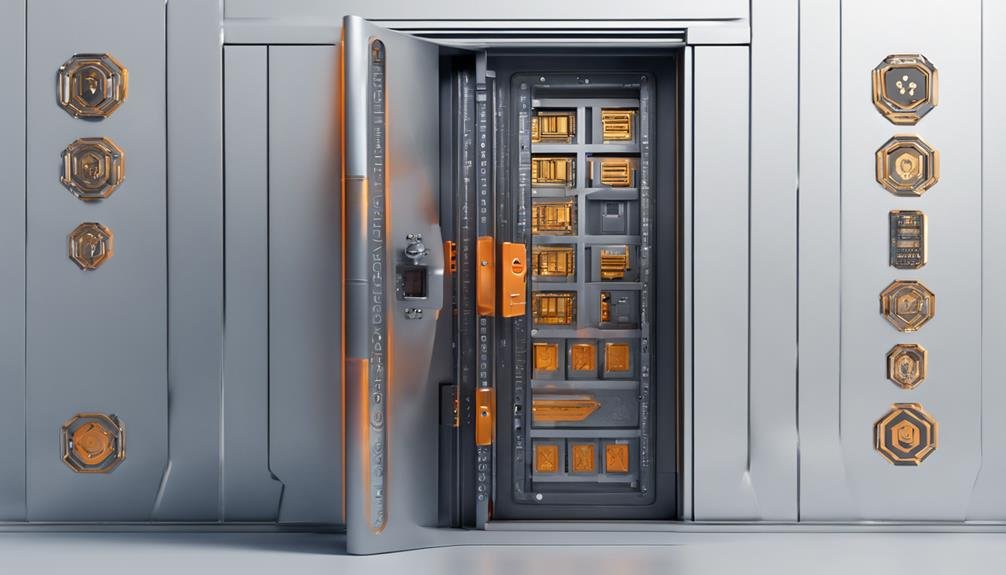Crypto custody is a crucial component for protecting your digital assets amidst the unpredictable cryptocurrency landscape. It involves securing private keys, which are essential for accessing your cryptocurrencies. Various custody solutions exist, including self-custody wallets and institutional services, each offering different levels of security. Hot storage enables quick access but carries higher risks, while cold storage greatly enhances safety for long-term holdings. Compliance with regulations and advanced security measures builds trust in custodians. Understanding these aspects is important for informed decision-making. You’ll find further insights on best practices and emerging trends in the evolving field of crypto custody.
Table of Contents
Brief Overview
- Crypto custody secures digital assets against theft and loss, ensuring robust protection for investors in a volatile market.
- Institutional custody services offer specialized solutions, enhancing security, compliance, and operational efficiency for large-scale investors.
- Hot storage is convenient for transactions but comes with higher risks; cold storage provides safer long-term asset protection.
- Multi-signature setups and hardware wallets significantly improve private key management, reducing unauthorized access to digital assets.
- Evolving regulations and technological advancements drive innovation in crypto custody, fostering investor confidence and enhancing security measures.
Introduction

In today’s fast-paced financial landscape, crypto custody plays an important role in securing digital assets like Bitcoin. As cryptocurrencies gain traction among investors, the need for reliable and secure crypto storage solutions becomes increasingly significant.
You mightn’t realize how volatile the cryptocurrency market can be, which makes proper digital asset custody essential for protecting your investments. The secure management of private keys, which is fundamental for digital asset holders, guarantees that risks such as the loss of up to 20% of Bitcoin due to misplaced keys are mitigated the importance of secure key management.
Institutional investors are particularly focused on Bitcoin custody and other cryptocurrencies, seeking robust mechanisms to safeguard their assets. This shift has led to a growing demand for institutional crypto custody services, as these entities require more than just a basic wallet. They need thorough solutions that offer safekeeping, trading capabilities, and portfolio management, all while guaranteeing security.
The evolution of technology has had a significant impact on crypto custody. With advancements in encryption and blockchain technology, custodians can now provide enhanced security measures, mitigating risks associated with hacks and theft.
This has made secure crypto storage not just a luxury, but a necessity for serious investors. As the market matures, the role of custodians becomes more pronounced, fostering investor confidence and facilitating mainstream adoption.
In this context, understanding the intricacies of crypto custody is important for anyone looking to navigate the complex world of digital assets. By grasping the significance of bitcoin custody and institutional crypto custody, you’ll be better equipped to make informed decisions about securing your investments in this dynamic financial ecosystem.
What Is Crypto Custody?
Crypto custody is all about securely managing and storing your digital assets, which is essential in today’s volatile market.
Custodians play an important role in enhancing security, offering services that protect your investments while boosting confidence in cryptocurrency.
Understanding the significance of Bitcoin custody can help you navigate the complexities of this evolving financial landscape.
The Role of Custodians in Crypto Security
As the digital asset landscape continues to expand, understanding the role of custodians in crypto security becomes essential for investors. Custodians provide custody in cryptocurrency by securely managing and storing digital assets, primarily focusing on safeguarding private keys. These entities have developed various crypto custody solutions that not only protect your assets but also enhance overall crypto security.
Custodians employ advanced technologies and protocols to guarantee secure cryptocurrency storage. By using cold storage, multi-signature wallets, and encryption, they mitigate risks associated with hacks and theft. Here’s a quick look at their key functions:
| Function | Description | Importance |
|---|---|---|
| Private Key Management | Safeguarding and overseeing access to private keys | Prevents unauthorized access |
| Asset Safekeeping | Storing digital assets securely | Reduces risk of loss or theft |
| Compliance and Reporting | Guaranteeing adherence to regulations | Builds trust and confidence in investors |
Why Is Bitcoin Custody Important?
Understanding Bitcoin custody is vital for both individual and institutional investors maneuvering the complexities of the cryptocurrency market. The security concerns related to Bitcoin storage are significant, making safe crypto custody a priority. Without proper custody solutions, you risk losing your assets to hacks, fraud, or mismanagement. That’s where institutional crypto custody providers come into play.
Here are three reasons why Bitcoin custody is important:
- Enhanced Security: The largest crypto custodians implement advanced security measures, including multi-signature wallets and cold storage, to safeguard your assets.
- Regulatory Compliance: With increasing regulatory scrutiny, having a reliable custodian guarantees compliance with laws, helping you avoid potential legal pitfalls.
- Peace of Mind: Knowing your Bitcoin is stored securely allows you to focus on your investment strategies without the constant worry of theft or loss.
In the future of crypto custody, technology will continue to evolve, providing even more robust solutions.
Types of Crypto Custody Solutions

When you’re considering crypto custody solutions, it’s vital to understand the different types available.
Each option, from self-custody wallets to institutional custody services, offers unique benefits and risks that can greatly impact your asset management strategy.
How to Choose the Right Custody Solution for You
Choosing the right custody solution for your crypto assets can make all the difference in safeguarding your investments.
Understanding your needs—whether you’re a retail or institutional investor—will guide you in making the best choice.
Here are three key factors to take into account:
- Storage Type: Decide between hot storage and cold storage. Hot storage is connected to the internet and offers quick access, but it’s more vulnerable. Cold storage, on the other hand, is offline and considerably safer, ideal for long-term holdings.
- Regulatory Compliance: Verify the custody provider adheres to the SEC rule for crypto custody. Compliance not only safeguards your crypto but also adds an extra layer of credibility to the provider.
- Provider Reputation: Look for the top crypto custody providers. Research their track record, security measures, and client feedback to confirm you’re selecting a trustworthy option.
Key Players in the Crypto Custody Space
When you consider the landscape of crypto custody, it’s essential to know the key players shaping the industry.
Major institutions like Coinbase Custody, Kraken, BitGo, Fidelity Digital Assets, and Gemini are at the forefront, offering important services that enhance security and trust.
These institutions not only safeguard assets but also streamline trading and portfolio management, making them critical partners for institutional investors in the crypto space.
Institutional Crypto Custody Providers
In the rapidly evolving landscape of digital assets, institutional crypto custody providers play a pivotal role in ensuring the secure management of cryptocurrencies for large-scale investors.
These providers are essential as they offer tailored solutions that adhere to regulatory requirements, particularly influenced by government and SEC rules.
Key features of institutional crypto custody providers include:
- Regulatory Compliance: They navigate complex regulations, ensuring that your assets meet the necessary legal standards, which enhances trust and security.
- Advanced Security Measures: Utilizing cutting-edge technology, these custodians protect your assets from theft and hacking, providing peace of mind in an otherwise volatile market.
- Comprehensive Services: Many offer additional services such as trading, portfolio management, and safekeeping, streamlining your investment process while maximizing efficiency.
As large-scale investors increasingly turn to crypto, aligning with reputable custody providers is vital for safeguarding your assets.
By partnering with these key players, you gain access to institutional-grade solutions that not only protect your investments but also foster confidence in the growing cryptocurrency market.
This integration of traditional finance with digital assets is instrumental in shaping the future of investment strategies.
Hot vs. Cold Storage: What’s the Difference?

When it comes to storing your crypto assets, understanding the difference between hot and cold storage is essential.
Hot storage keeps your private keys online, making it convenient for frequent transactions but also more vulnerable to hacks.
On the other hand, cold storage securely stores your keys offline, making it a safer option for long-term holders who prioritize security over accessibility.
Private Keys and Custody: What You Need to Know
Understanding the role of private keys is vital for anyone involved in cryptocurrency, as these keys are the gatekeepers to your digital assets. Without them, accessing your Bitcoin or other cryptocurrencies becomes impossible. Custody providers manage these private keys with utmost care, employing both hot and cold storage solutions to enhance security.
Here are three key aspects of how custody providers handle private keys:
- Hot Storage: This involves keeping private keys online for quick access, making it easier to execute transactions but increasing exposure to cyber threats.
- Cold Storage: In contrast, cold storage refers to keeping private keys offline, considerably reducing the risk of hacking. This method is ideal for long-term storage of digital assets.
- Multi-Signature Solutions: Many custodians utilize multi-signature wallets, requiring multiple keys to authorize a transaction, adding an extra layer of security.
Ultimately, understanding how private keys work and the strategies custody providers use can empower you to make informed decisions.
Safeguarding your digital assets is vital, especially in a volatile market, where the right custody solutions can provide peace of mind.
The Future of Crypto Custody
As regulations evolve, they play an essential role in shaping the future of crypto custody solutions.
You’ll find that compliance requirements can influence how custodians operate, pushing them to adopt more robust security measures and transparent practices.
This regulatory landscape not only impacts institutional adoption but also helps build trust among investors looking for secure ways to manage their digital assets.
How Regulations Are Shaping Custody Solutions
Regulations are increasingly shaping the landscape of crypto custody, influencing how custodians operate and manage digital assets. Global regulatory bodies like the SEC are playing a pivotal role, establishing standards that custodians must adhere to.
These regulations help create a safer and more transparent environment for investors, especially institutional players who demand rigorous compliance.
Here are three key impacts of regulations on custody solutions:
- Enhanced Security Measures: Regulations often require custodians to implement advanced security protocols, safeguarding digital assets from theft and fraud.
- Standardization of Practices: Regulatory guidelines help standardize custody practices across the industry, ensuring that all custodians meet minimum requirements for asset protection and management.
- Increased Investor Confidence: By enforcing compliance and transparency, regulations foster greater trust among investors, encouraging more participants to enter the crypto market.
As regulations evolve, they drive innovation in custody solutions, pushing custodians to adopt new technologies and practices that not only meet compliance but also enhance the overall security and efficiency of asset management.
It’s clear that regulations will continue to play a significant role in shaping the future of crypto custody.
Best Practices for Safeguarding Your Crypto

To safeguard your crypto effectively, it’s vital to implement a combination of strategies that enhance the security of your digital assets.
First, consider using hardware wallets. These devices store your private keys offline, greatly reducing the risk of hacking. By keeping your keys away from internet access, you bolster your defenses against potential threats.
Next, think about adopting a multisig (multi-signature) setup. This method requires multiple signatures to authorize transactions, making it much harder for unauthorized parties to access your funds. For example, you might set it up so that three out of five keys are needed to transact, adding a layer of security that single-key wallets lack.
Regular audits are another important practice. Periodically review your crypto holdings and the security measures in place. This includes checking the security of your custody provider and ensuring that their systems are up-to-date with the latest security protocols. An audit can help you identify vulnerabilities and address them before they become major issues.
Lastly, always stay educated about the evolving landscape of crypto security. New threats emerge regularly, and staying informed can help you adjust your strategies accordingly.
Conclusion
In the ever-evolving world of cryptocurrency, selecting the right custody solution is crucial for securing your digital assets. As institutional investors navigate this volatile landscape, choosing a reliable custody service becomes critical.
With the increasing demand for secure storage, custodian banks are stepping up to offer robust solutions, guaranteeing safety and peace of mind.
Here are three key reasons why selecting the right crypto custody solution matters:
- Security Assurance: Custodians leverage advanced technology and security protocols to protect your assets from hacks and theft. This added layer of security is essential in preserving your investments.
- Regulatory Compliance: Institutional-grade custody services understand the complex regulatory landscape. They guarantee that your assets are managed in compliance with local and international laws, reducing the risk of legal complications.
- Operational Efficiency: A solid custody solution provides not just storage but also trading and portfolio management capabilities. This all-encompassing service streamlines your operations, allowing you to focus on your investment strategy.
Frequently Asked Questions
How Do I Choose the Right Crypto Custodian for My Needs?
Choosing the right crypto custodian involves evaluating several key factors.
First, assess their security measures—look for strong encryption and insurance against losses.
Next, consider their regulatory compliance and reputation in the industry.
Check the range of services they offer, such as trading and portfolio management, to guarantee they meet your needs.
What Fees Are Typically Associated With Crypto Custody Services?
When considering crypto custody services, you’ll typically encounter several fees.
These may include setup fees, annual storage fees, transaction fees for deposits and withdrawals, and sometimes performance fees based on asset growth.
The fee structure can vary markedly between custodians, so it’s essential to review their pricing models carefully.
Understanding these costs will help you assess the value of the services provided and align them with your investment strategy and budget.
Can I Access My Assets Stored With a Custodian Anytime?
You can typically access your assets stored with a custodian, but it often depends on the specific terms of your custody agreement.
Most custodians provide online platforms for account management, allowing you to view and manage your assets.
However, withdrawal processes may involve verification steps to guarantee security.
Consequently, while access is generally available, the speed and ease of accessing your assets can vary based on the custodian’s protocols and your agreement.
What Happens if My Crypto Custodian Goes Bankrupt?
If your crypto custodian goes bankrupt, it can complicate access to your assets.
Typically, custodians hold assets in segregated accounts, which may be protected during bankruptcy proceedings. However, the recovery process could take time, and you might face delays.
It’s essential to understand the custodian’s financial health and the regulations in place. Always review the custodian’s policies regarding asset protection, ensuring you’re aware of any risks involved in storing with them.
Are Crypto Custodians Regulated or Insured Against Losses?
Crypto custodians vary in regulation and insurance. Some custodians operate under strict financial regulations, guaranteeing compliance with laws designed to protect investors.
Others may not be as regulated, which increases risk. Insurance against losses also differs; some custodians offer coverage for theft or loss, while others do not.
It’s essential for you to research each custodian’s regulatory status and insurance policies to make sure your digital assets are adequately protected.



